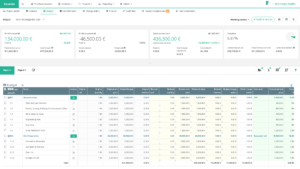In the dynamic field of construction, the role of a construction quantity surveyor stands out as both crucial and multifaceted. These professionals are the financial whizzes and contract gurus who ensure that construction projects are economically viable, legally compliant, and completed on budget. But what exactly does a quantity surveyor do in construction? From the initial cost estimates to the final project close-out, quantity surveyors are involved in nearly every aspect of project management. Their expertise in cost planning, contract management, and risk assessment is indispensable in steering construction projects to successful completion.
This blog post dives deep into a construction quantity surveyor’s essential functions and duties, shedding light on how they bring value to the construction industry and detailing the path one might follow to enter this rewarding profession. Join us as we explore the comprehensive role, responsibilities, duties, and potential earnings of a construction quantity surveyor, along with insights into becoming one yourself.
Table of Contents
What is a quantity surveyor in construction?
A quantity surveyor (QS) in construction is a professional who specializes in managing all costs related to building and civil engineering projects, from the initial calculations to the final figures. Their main goal is to minimize expenses and enhance value for money while ensuring the project meets all legal and quality standards.
Here’s a more detailed look at what a quantity surveyor does:
- Cost Planning and Management: Quantity surveyors estimate and control costs for construction projects. They use their expertise to forecast financial impact and help plan the budget throughout the project lifecycle. They prepare detailed reports that outline costs and help stakeholders make informed decisions.
- Contract Management: They are crucial in managing contracts between clients and vendors. This includes preparing contract documents, advising on contracting methods, and helping with procurement strategies.
- Value Engineering: QSs work to improve a project’s efficiency and value by identifying cost-saving opportunities that do not compromise quality. They review designs and procedures to make recommendations on how to reduce costs while achieving the desired results.
- Risk Management: By analyzing the risks involved in a project, quantity surveyors help to mitigate them. They assess potential financial implications and recommend strategies to manage risk.
- Project Management: Although project management may not be their primary role, many quantity surveyors have the skills and knowledge to oversee projects. They ensure that projects are completed on time, within budget, and to the standards required.
- Dispute Resolution: When disputes over costs or variations in the project arise, quantity surveyors can act as mediators. They also provide detailed and accurate documentation that can be used in legal disputes.
- Regulatory Compliance: Quantity surveyors ensure that projects comply with various legal and quality standards and regulations. They are well-versed in building codes, safety regulations, and sustainability practices.
Quantity surveyors are integral to construction projects because they deeply understand construction processes, materials, and costs. Their expertise enables more efficient resource use, helps avoid legal and financial issues, and ensures positive economic outcomes. Whether they work for consultancy firms, construction companies, or freelance, their skills are crucial for successfully delivering construction projects.
What are quantity surveyor duties in construction?
The duties of a quantity surveyor in construction are multifaceted and crucial for the efficient management and successful completion of construction projects. Here’s a breakdown of the key responsibilities they typically handle:
- Cost Estimation and Feasibility Studies: Even before a project begins, quantity surveyors assess its feasibility by analyzing costs relative to projected outcomes. They provide detailed estimates to ensure a project’s financial viability and identify the required resources.
- Budget Management: Throughout the project, they manage and optimize the budget. This involves continuously monitoring costs, forecasting future expenses, and making adjustments as necessary to keep the project financials on track.
- Procurement Strategy: Quantity surveyors formulate the procurement strategy, select contractors, and negotiate prices and terms. They ensure that all procurement is done in line with legal requirements and achieves the best value for money.
- Contract Administration: They prepare contract documents, including bills of quantities and other tender documentation. During the construction phase, they manage these contracts, overseeing invoicing and payment to ensure that all financial transactions are transparent and fair.
- Value Engineering: Quantity surveyors recommend ways to save money without compromising essential quality or compliance requirements. They work closely with engineers and architects to ensure that alternative materials, techniques, or strategies deliver desired outcomes more cost-effectively.
- Risk Management: They identify potential financial risks involved in a project and use their expertise to mitigate these risks through strategic planning and careful management of resources.
- Project Monitoring and Reporting: Quantity surveyors monitor progress against the plan, budget, and schedule. They provide regular reports to stakeholders on the financial status, progress, and any issues that must be addressed.
- Change Management: They handle and assess the cost impact of changes and manage change orders in construction contracts. This includes negotiating the costs of variations and ensuring that all parties agree to any changes.
- Dispute Resolution: In case of disputes over costs or project specifications, quantity surveyors provide expert advice and documentation and may act as mediators to help resolve conflicts.
- Completion and Post-Construction Services: As projects near completion, they assess the work and ensure that it meets the standards and specifications laid out in the contract. They also handle final accounts and close-out documentation, resolving outstanding claims or adjustments.
Through these diverse responsibilities, quantity surveyors ensure that construction projects are executed efficiently, within budget, and to the required standards. They serve as a crucial link between the operational and financial aspects of construction management.
What is the role of a quantity surveyor in construction?
The role of a quantity surveyor in construction is pivotal, acting as the financial and contractual backbone of a project. They manage and optimize all costs associated with building and civil engineering projects, ensuring that the highest quality and value for money are maintained. Here’s a more detailed look at their role:
- Cost Management: From the outset, quantity surveyors are involved in planning and estimating the costs of a construction project. They prepare cost forecasts and continue to manage and monitor these costs throughout the project lifecycle. Their expertise helps ensure the project stays within budget without sacrificing quality.
- Contract Management: They are integral in drafting and negotiating contracts with suppliers and contractors. Quantity surveyors ensure that all contractual terms are fair and legally binding, covering all aspects, such as payment terms, deadlines, and penalties for non-compliance.
- Procurement: Quantity surveyors handle the procurement of materials and services, deciding on the best strategies and methods to acquire the necessary resources at the best prices. This often involves tendering processes and selecting contractors and suppliers based on a balance of cost, capability, and quality.
- Value Engineering and Cost Saving: Throughout the project, they assess and suggest alternatives to reduce costs while maintaining functional and quality requirements. This could involve alternative construction methods, materials, or designs that provide better value for money.
- Risk Management is crucial in identifying and developing strategies to mitigate potential financial risks. By foreseeing possible pitfalls, it helps plan preventive measures to avoid cost overruns.
- Regulatory Compliance: Quantity surveyors ensure construction projects comply with local laws and regulations. This includes adhering to building standards, environmental regulations, and safety laws throughout the project.
- Project Monitoring: They regularly monitor the progress of construction projects, ensuring that development aligns with financial projections and timelines. Regular reports to stakeholders about the financial status and ongoing progress are a vital part of their role.
- Dispute Resolution: Quantity surveyors also manage disputes related to costs or contractual misunderstandings. With their detailed understanding of the contracts and the financial aspects of construction, they are well-equipped to provide clear, impartial advice.
- Final Account Settlement: At the end of a project, quantity surveyors prepare the final accounts and settle the budget, ensuring that all financial obligations are clear and agreed upon by all parties involved.
Overall, the role of a quantity surveyor is essential for the financial health and contractual integrity of construction projects. They ensure efficient use of resources, compliance with legal standards, and ultimately protect their clients’ financial interests.
What is the construction quantity surveyor’s salary?
The salary of a construction quantity surveyor can vary considerably depending on several key factors, such as their level of experience, the job location, the size of the company they work for, and the specific demands of the projects they manage.
- Entry-Level Salaries: When starting, quantity surveyors often earn salaries that reflect their initial position on the learning curve. In the United States, this might range from about $40,000 to $60,000 annually. Over in the UK, beginners can expect to make between £20,000 and £30,000 per year.
- Mid-Career Salaries: As quantity surveyors gain experience and take on more responsibility, their compensation increases accordingly. In the US, a mid-career quantity surveyor with around 5 to 10 years of experience might earn between $60,000 and $85,000. In the UK, such professionals might see their earnings range from £30,000 to £50,000.
- Senior-Level Salaries: Experienced quantity surveyors who manage complex projects or rise to senior positions within their organizations can earn significantly more. In the US, salaries at this level can range from $85,000 to over $120,000, depending on the role’s complexity and the company’s size. UK-based senior quantity surveyors can expect to earn between £50,000 and £70,000, and potentially even more, especially in high-demand areas or specialized sectors.
- Consultancy and Freelance Work: Quantity surveyors with a strong track record and network might choose to work independently as consultants or freelancers. This can lead to highly variable earnings but also offers the potential to earn significantly more than those in permanent positions, especially if they secure contracts with major projects.
- Location Differences: Geographic location plays a significant role in determining salaries. For example, quantity surveyors in major urban centers or regions with a booming construction industry (such as New York City, London, or certain parts of the Middle East) often command higher salaries than those in less economically vibrant areas.
- Additional Benefits: In addition to their basic salary, quantity surveyors often receive additional benefits like bonuses, pension contributions, and health insurance. These benefits can add considerable value to the total compensation package.
Overall, the role of a quantity surveyor can be pretty lucrative, especially as one gains more experience and moves into higher-level positions. The career also offers good prospects for those looking to work internationally, where salaries can be competitive in the global market.
How to become a construction quantity surveyor?
Becoming a construction quantity surveyor is a rewarding career path that blends financial management, project oversight, and cost control in the construction industry. Here’s a comprehensive guide on how to embark on this career:
- Educational Foundation:
- Degree Requirements: Most quantity surveyors start with a bachelor’s degree in quantity surveying, construction management, civil engineering, or a related field. These programs teach essential skills like cost estimation, project management, and contract law.
- Accredited Programs: It is beneficial to choose a program accredited by relevant professional bodies. For instance, in the UK, accreditation by the Royal Institution of Chartered Surveyors (RICS) is highly regarded. In the US, look for programs recognized by bodies such as the American Institute of Constructors (AIC) or the Construction Management Association of America (CMAA).
- Gain Practical Experience:
- Internships: While studying, try to secure internships in the construction industry. Internships are invaluable for gaining hands-on experience and understanding the day-to-day tasks of a quantity surveyor.
- Entry-Level Jobs: After graduation, start in entry-level roles such as a junior quantity surveyor. These roles provide the practical experience needed to manage budgets, prepare cost forecasts, and handle contracts.
- Professional Certification and Membership:
- In the UK: Becoming chartered with RICS is a significant career milestone. This involves completing the Assessment of Professional Competence (APC), which requires a few years of professional experience and passing a comprehensive assessment.
- In the US: Consider pursuing certifications like Certified Construction Manager (CCM) from CMAA or certifications from AIC. These aren’t mandatory but can enhance your credentials and job prospects.
- Continuous Learning and Development:
- Stay Updated: The construction industry continuously evolves, so it’s crucial to stay current with the latest technologies, regulations, and practices. Attend workshops and seminars and continue your professional education.
- Specialization: To help you stand out in the job market, you might also consider specializing in a niche area, such as commercial, residential, or infrastructure projects.
- Networking and Professional Growth:
- Join Professional Organizations: Being active in professional organizations can provide networking opportunities, professional resources, and career development programs.
- Build Industry Connections: Networking is vital in the construction industry. Attend industry conferences, seminars, and local chapter meetings to connect with other professionals.
- Develop Essential Skills:
- Technical Skills: Proficiency in industry-specific software for project management and cost estimation is crucial.
- Soft Skills: Effective communication, negotiation, problem-solving, and analytical skills are essential for dealing with clients, contractors, and other stakeholders.
- Legal and Regulatory Knowledge:
- Understand Compliance: Quantity surveyors must ensure that projects comply with local laws and regulations, which requires a good understanding of these legal frameworks.
Starting your career as a quantity surveyor involves a combination of formal education, practical experience, and ongoing professional development. This role offers the chance to work on diverse projects and can be dynamic and fulfilling, especially if you enjoy a mix of office-based and on-site work.
Conclusion
In conclusion, the role of a quantity surveyor in construction is integral to the success of any project. These professionals not only ensure that projects are completed within budget but also uphold stringent standards of quality and compliance. With responsibilities that span cost management, contract negotiation, and risk mitigation, quantity surveyors are truly the keystone of construction projects. They bring technical knowledge, strategic insight, and financial acumen, making them invaluable across both the planning and execution phases of construction.
For those considering a career as a quantity surveyor, the path involves rigorous education, practical experience, and continuous professional development. However, the rewards are significant, offering opportunities to work on diverse projects, the potential for attractive remuneration, and the professional satisfaction of playing a critical role in shaping the built environment. Whether you’re already in the field or just starting, the journey of a construction quantity surveyor is one of lifelong learning and significant impact, ensuring that construction projects not only start on a solid foundation but also conclude with strong finishes.
About the Author

Taavi Kaiv
Taavi Kaiv is a construction specialist with over ten years of experience in the construction industry. Taavi is an accomplished construction project manager with many successful projects that have been completed under his guidance. Taavi holds a master’s degree in construction management from the Tallinn University of Technology. View profile






